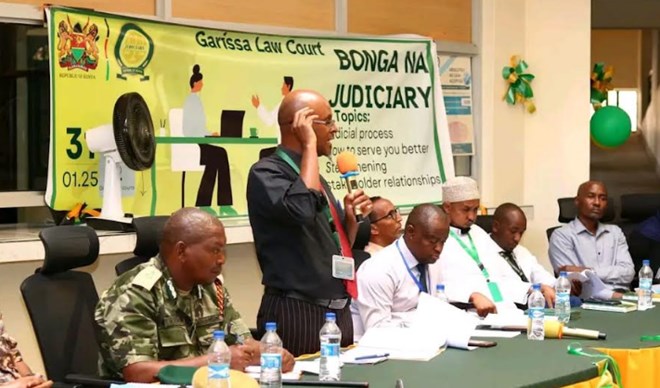
By Erick Kyalo and Grace Nyawira
Sunday February 2, 2025

Garissa residents have been urged to embrace Alternative Dispute Resolution (ADR) mechanisms for cases that are not criminal in nature to help area courts clear case backlogs.
Some of the ADR mechanisms include reconciliation, mediation, arbitration, and traditional and religious methods such as Maslah for the Islamic community.
Speaking during a public engagement forum with key stakeholders and members of the public, Garissa Chief Magistrate Thomas Mwangi said that in most cases, ADR provides for a win-win outcome since the parties agree with the resolutions, unlike in court decisions.
“The constitution has provided for other ways to resolve disputes without going through court proceedings, which include ADR. We bring in elders, arbitrators, or other parties who volunteer to mediate disputes to help in settling the cases out of court,” Mwangi said.
“However, we cannot recommend cases such as those involving FGM, Sexual offenses, robbery with violence, and other criminal cases to be resolved using alternative justice systems. However, for other cases, as long as all the parties have agreed to use those mechanisms because the courts cannot force them to lodge the cases with them,” he added.
The Chief Magistrate further revealed that not all cases require witness testimonies because parties can agree and draft an agreement, which is legally deposited with the court through court-annexed mediation.
He advocated for the ADR mechanisms, noting that it takes a shorter time and resources as compared to court cases and will help in reducing case backlogs.
On clearing the cases that have dragged on for long, the magistrate noted that the courts have adopted active case management as a key measure, which involves inviting both parties, gauging their readiness for hearing, and making sure everything is ready for the proceeding of the cases immediately.
Mwangi said that one-year and older cases have been marked for speedy conclusion under active case management and applied a no-adjournment policy that is aimed to ensure that the cases are expedited.
“Active case management is where the court has a checklist of the readiness of the case for conclusion,” Mwangi explained.
“The court gauges their readiness and puts all the nuts and bolts together to ensure that at the hearing there is no adjournment,” he said.
Bonnie Okemwa, the Regional ODPP Coordinator for Northeastern region, decried that there has been a challenge in procuring witnesses in prosecuting their cases, thus causing delay.
Okemwa said that in most cases, which involve family members or relatives, witnesses at some stage become unwilling, especially where the family involves other dispute resolution methods.
“Witnesses are key players in our judicial systems. We cannot be able to serve society better if we fail to procure witnesses for the purposes of prosecuting our cases. The challenge that we are facing is that we fail to have them in good time, leading to a backlog,” Okemwa said.
“In most cases, we keep on adjourning cases for simple reasons, the first being the unavailability of witnesses, witness tampering due to alternative justice mechanisms like the Maslah, and/or maybe intimidation of witnesses,” he added.